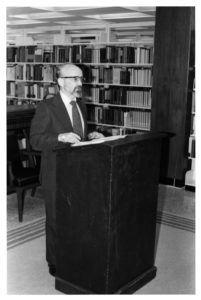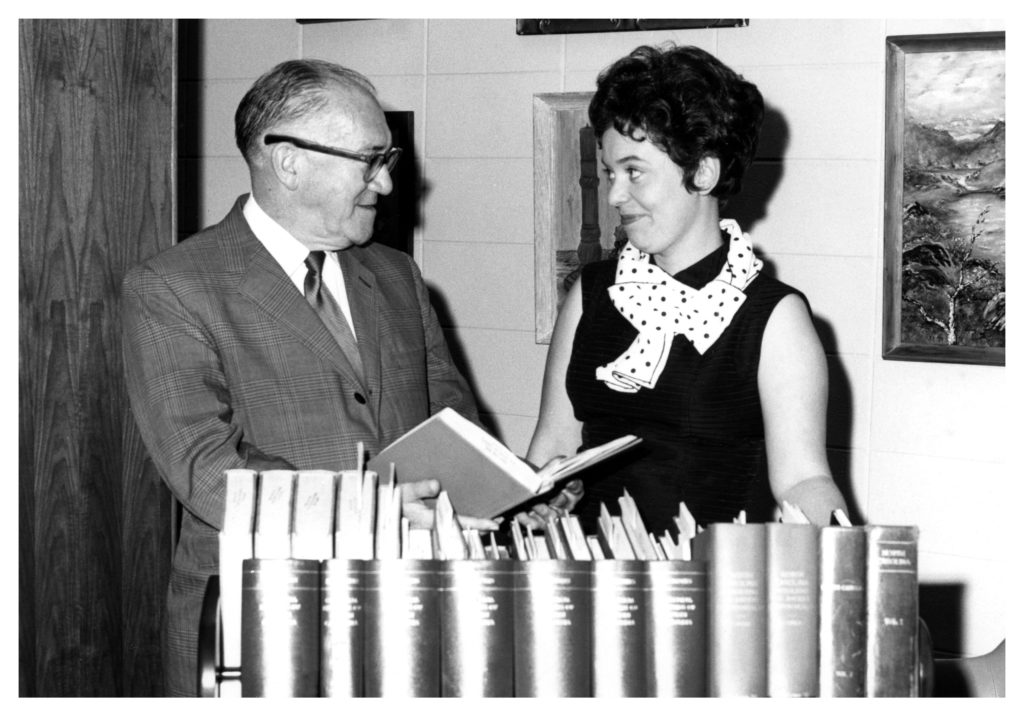The W.L. Eury Appalachian Collection at Appalachian State University
by Trevor McKenzie
This article appeared in the Volume 1, Issue 1 Spring/Summer 2019 issue of the Appalachian Curator. Click here to view a PDF of the full issue.
The W.L. Eury Appalachian Collection at Appalachian State University recently celebrated half a century of collecting, cataloging, processing, and preserving materials on the Appalachian region. Although customary, it would hardly be appropriate to call this celebration a “golden anniversary.” Perhaps something more Appalachian should mark this milestone, something solid, like the “Amphibolite Anniversary”? Regardless of whatever metal or rock usually shines over these occasions, researchers worldwide know and appreciate the W.L. Eury Appalachian Collection as a jewel unto itself.

The Eury Collection’s roots extend back to 1943 and to the collecting efforts of the premiere Appalachian scholar, Cratis Williams. Williams, although a recent arrival to the campus of Appalachian State Teachers College, was eager to construct a course entitled “Ballads and Songs.” In looking for materials on regional balladry and mountain people within the library stacks, Williams found only a handful of volumes. To rectify this lack of Appalachian-focused materials, Williams, with the permission of Librarian W.L. Eury, began to seek out books on mountain life and folk songs. Williams redoubled his efforts in the 1950s, enlisting Acquisitions Librarian Zeb Shook to seek out and purchase books found in the Selected Bibliography of his dissertation, The Southern Mountaineer in Fact and Fiction. The books collected by Williams and Shook for this seminal work in the field of Appalachian Studies formed the nucleus of what would grow into a vast collection.
Throughout the 1950s and 1960s, the Collection remained small in size and scope, evolving through a number of name changes (including “The North Carolina Room”) before appearing in the 1968 Belk Library Handbook as “The Appalachian Room.” While taking a faculty spouse tour of the library, Charlotte Ross, a north Georgia native and wife of History professor (and later Chair of the Center for Appalachian Studies) Dr. Carl Ross, expressed interest in the room and its contents. The next year, Ross was appointed the first Collection Librarian and the “Appalachian Room” was gradually expanded to become the W.L. Eury Appalachian Collection. At the Collection’s dedication on October 18, 1971, Cratis Williams spoke earnestly about the collection’s significance and its future:
In the early days of Appalachian State University the cultural tradition, handcrafts, and artifacts of the people served by the University were taken for granted. Educational programs were directed toward the orientation of the sons and daughters of the mountain farmers to a general American culture; and what lay immediately about them was largely ignored. In time, though, owing to the vision of such men as Dr. I. G. Greer, a native son and long-time instructor at the college, Dr. W. Amos Abrams, and the librarian, W. L. Eury, the institution became interested in building a collection of Appalachian materials for the use of students and scholars who desire to study the local history, culture, and social problems of the region. This collection, already one of the most important in the region, is destined to grow.
Williams’ acknowledging of fellow faculty and ballad collectors, Greer and Eury, foreshadowed the donation of their ballad transcriptions and field recordings to the archives of the growing Collection. The Eury Collection’s early strength in music materials was further augmented by such donations as the recordings of Beech Mountain, North Carolina folk toy and music entrepreneur Jack Guy, the diaries and song repertoire of Kentucky ballad singer Virgil Sturgill, and the ballad collection of the James York family of Wilkes County, North Carolina. The Appalachian Oral History Project, funded through the then newly-founded Appalachian Consortium, also provided audio materials to the collection as well as recording equipment for researchers and students engaged in collecting oral histories.

After Charlotte Ross moved to another position within the University, Margaret Vannoy served as Acting Collection Librarian from spring 1976 until February 1978. In June of that year, Eric Olson, a trained librarian who had previously worked as a cataloger at Western Carolina University, was hired as Collection Librarian. Olson, who also moonlighted as the banjo player with the Chapel Hill-based Fuzzy Mountain String Band, continued to find materials that further built on the Collection’s strength in documenting regional music traditions. The Collection was very much a mobile entity during Olson’s tenure, making several moves before eventually settling into the second floor of University Hall, a building located a mile from Appalachian State University’s campus, in 1990. At University Hall, the collection continued to grow while operating alongside the office of Appalachian Journal and the now-defunct Appalachian Cultural Museum. Among the notable donations during the Olson years were the papers of Senator James T. Broyhill, the records of the Appalachian Land Ownership Survey, and the papers of Cratis Williams. Unfortunately, Olson’s time at the helm of the Collection was cut short by health issues which forced him to retire in 1993. Library Assistant Dean Williams served as Acting Collection Librarian in the period after Olson’s retirement.
The Collection’s current Librarian, Dr. Fred J. Hay, was appointed in August 1994. Hay, a native north Georgian with a Ph.D. in Anthropology, threw himself into the role of the collector and actively sought out donors for materials and funds to help the Collection grow. Under Hay’s tenure the Collection moved back to its old location in the Belk Library in 1996, before moving to its current location in the new Belk Library and Information Commons in 2005. Since the beginning of his time as Collection Librarian, Hay has pushed to expand the both the size and the scope of the Eury Collection. The introduction to Hay’s own Collection history hinted at his intention to continue to build a comprehensive repository on the mountain region:
The W.L. Eury Appalachian Collection is a repository for materials related to the Southern uplands. It is a comprehensive, multi-disciplinary library with special strengths in folklore, ethnography, music, religion, local history, genealogy, literature, cookery, and African and Native Appalachia.
This succinct description of the Collection belies the growth it has experienced within the span of Hay’s time as its curator. Under Hay’s leadership the collection has added, among hundreds of other accessions, the papers of Appalachian scholars such as Helen Lewis and John Gaventa, the records of the Highlander Center, and the papers and recordings of bluegrass festival pioneer Carlton Haney. Hay has also expanded the Collection’s holdings on Native Americans and African American communities within the region and successfully petitioned the Library of Congress to change their subject heading on Appalachian people from “Mountain Whites” to “Appalachians (People).”
After 50 years of growth, the W.L. Eury Appalachian Collection’s stacks now hold nearly 60,000 volumes on the Appalachian Region, making it the largest collection of secondary sources on Appalachia in the world. The growth of its archival holdings also continues daily with a wide swath of materials ranging in subject from music to geology being accessioned on a regular basis. The Collection regularly hosts researchers from as far afield as Japan, Spain, and the United Kingdom, many of whom have returned on multiple research trips to use collection materials. With half a century to celebrate, the Eury Collection looks forward to continuing its mission to grow in size and scope, with a depth and quality of resources that match the complexity of the Appalachian region and its people.
Trevor McKenzie is Archival Assistant at the W.L. Eury Appalachian Collection. mckenzietj@appstate.edu